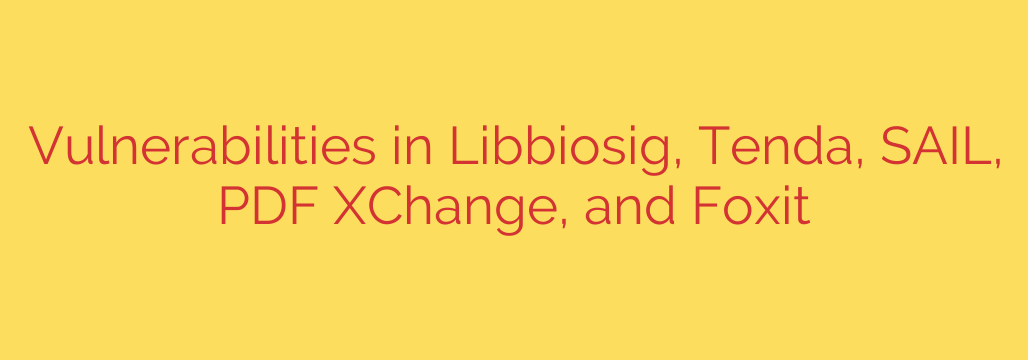
Urgent Security Alert: Update Your Routers, PDF Software, and Key Libraries Now
In today’s interconnected world, staying ahead of digital threats is more critical than ever. A new wave of security vulnerabilities has been discovered across a range of widely used software and hardware, from home routers to popular PDF readers and specialized developer libraries. These flaws could allow attackers to execute malicious code, steal sensitive data, or take complete control of affected systems.
Understanding these threats is the first step toward protection. Below is a breakdown of the critical vulnerabilities recently identified and the essential steps you need to take to secure your devices and data.
Tenda AC Series Routers: Critical Remote Command Injection Flaw
Many popular Tenda routers, particularly models in the AC series, have been found to contain a severe command injection vulnerability. This flaw exists in a function that manages device connections and can be exploited by an unauthenticated attacker on the same local network.
By sending a specially crafted request, an attacker can bypass security checks and execute arbitrary commands on the router with the highest level of privileges. This effectively gives an attacker full control over your home network, allowing them to monitor your internet traffic, redirect you to malicious websites, or launch further attacks on other devices connected to your network.
- Action Required: If you own a Tenda AC-series router, it is crucial to check for and install the latest firmware update immediately. You can typically do this by logging into your router’s web administration panel.
Major PDF Readers at Risk: Foxit and PDF-XChange Vulnerabilities
Two of the most popular alternatives to Adobe Acrobat Reader, Foxit PDF Reader and PDF-XChange Editor, have been found to contain critical vulnerabilities that could lead to remote code execution (RCE). Both flaws are categorized as “Use-After-Free” issues, which can be triggered when a user opens a maliciously crafted PDF document.
The danger here is significant. Opening a seemingly harmless document—such as a fake invoice or resume—could allow an attacker to run malicious code on your system. This could lead to a malware infection, ransomware, or the theft of your personal and financial information. Because PDF files are so common in both personal and professional settings, this threat vector is particularly serious.
- Action Required: Update your Foxit PDF Reader and PDF-XChange Editor to the latest available versions to patch these critical security holes. Enabling automatic updates is highly recommended to protect against future threats.
Libbiosig for C/C++: Buffer Overflow in Biomedical Data Library
For developers working in the scientific and medical fields, a critical vulnerability has been identified in Libbiosig, a library used for processing biomedical signal data formats like ECG and EEG. The flaw is a heap-based buffer overflow that occurs when the library attempts to handle a malformed data file.
This vulnerability can be triggered when an application using the library opens a specially crafted file. The result could be an application crash or, in a worst-case scenario, arbitrary code execution. This poses a significant risk to the integrity and security of sensitive medical and research applications.
- Action Required: Developers and administrators of systems using Libbiosig must update to the patched version 2.5.3 or later to mitigate this risk.
SAIL Lab’s N-Way-Rel-Graph-Query-V2: Path Traversal Vulnerability
Another developer-focused vulnerability has been discovered in a component from the Speech, Audio, Image, and Language (SAIL) Lab. The issue is a path traversal flaw, which allows an attacker to access files and directories stored outside of the intended folder.
By manipulating file path inputs, an attacker could potentially read sensitive configuration files, source code, or user data from the underlying server. This could lead to a significant data breach, exposing confidential information that should remain protected.
- Action Required: Any project or application utilizing this specific SAIL component should be updated to the latest secure version as soon as possible.
Your Proactive Security Checklist
While these specific vulnerabilities require immediate attention, they also serve as a reminder of the importance of consistent digital hygiene. Here are actionable steps you can take to protect yourself from these and future threats:
- Stay Updated: The single most effective defense is to keep all your software, firmware, and operating systems up to date. Developers constantly release patches to fix security flaws like these.
- Enable Automatic Updates: Whenever possible, enable automatic updates for your applications and devices. This ensures you receive critical security patches as soon as they are available, without needing to act manually.
- Be Wary of Unsolicited Files: Be extremely cautious when opening email attachments or downloading files from the internet, especially from unknown sources. Even a simple PDF can be a gateway for an attack.
- Secure Your Network: Beyond updating your router’s firmware, ensure you have changed the default administrator password to something strong and unique. A weak or default password can render firmware updates useless.
Source: https://blog.talosintelligence.com/libbiosig-tenda-sail-pdf-xchange-foxit-vulnerabilities/








